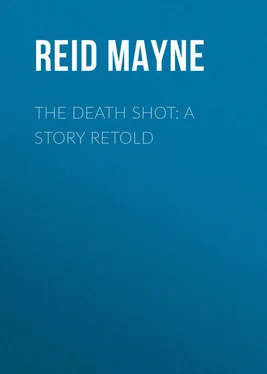Mayne Reid - The Death Shot - A Story Retold
Здесь есть возможность читать онлайн «Mayne Reid - The Death Shot - A Story Retold» — ознакомительный отрывок электронной книги совершенно бесплатно, а после прочтения отрывка купить полную версию. В некоторых случаях можно слушать аудио, скачать через торрент в формате fb2 и присутствует краткое содержание. Жанр: literature_19, foreign_antique, foreign_prose, на английском языке. Описание произведения, (предисловие) а так же отзывы посетителей доступны на портале библиотеки ЛибКат.
- Название:The Death Shot: A Story Retold
- Автор:
- Жанр:
- Год:неизвестен
- ISBN:нет данных
- Рейтинг книги:3 / 5. Голосов: 1
-
Избранное:Добавить в избранное
- Отзывы:
-
Ваша оценка:
- 60
- 1
- 2
- 3
- 4
- 5
The Death Shot: A Story Retold: краткое содержание, описание и аннотация
Предлагаем к чтению аннотацию, описание, краткое содержание или предисловие (зависит от того, что написал сам автор книги «The Death Shot: A Story Retold»). Если вы не нашли необходимую информацию о книге — напишите в комментариях, мы постараемся отыскать её.
The Death Shot: A Story Retold — читать онлайн ознакомительный отрывок
Ниже представлен текст книги, разбитый по страницам. Система сохранения места последней прочитанной страницы, позволяет с удобством читать онлайн бесплатно книгу «The Death Shot: A Story Retold», без необходимости каждый раз заново искать на чём Вы остановились. Поставьте закладку, и сможете в любой момент перейти на страницу, на которой закончили чтение.
Интервал:
Закладка:
For some minutes he remains upon the log, with the gun resting across his knees, and his head bent over the barrels. He appears engaged in some abstruse calculation. A new thought has sprang up in his mind – a scheme requiring all his intellectual power to elaborate.
“I shall keep that tryst,” he says, in soliloquy, seeming at length to have settled it. “Yes; I’ll meet her under the magnolia. Who can tell what changes may occur in the heart of a woman? In history I had a royal namesake – an English king, with an ugly hump on his shoulders – as he’s said himself, ‘deformed, unfinished, sent into the world scarce half made up,’ so that the ‘dogs barked at him ,’ just as this brute of Clancy’s has been doing at me. And this royal Richard, shaped ‘so lamely and unfashionable,’ made court to a woman, whose husband he had just assassinated – more than a woman, a proud queen – and more than wooed, he subdued her. This ought to encourage me; the better that I, Richard Darke, am neither halt, nor hunchbacked. No, nor yet unfashionable, as many a Mississippian girl says, and more than one is ready to swear.
“Proud Helen Armstrong may be, and is; proud as England’s queen herself. For all that, I’ve got something to subdue her – a scheme, cunning as that of my royal namesake. May God, or the Devil, grant me like success!”
At the moment of giving utterance to the profane prayer, he rises to his feet. Then, taking out his watch, consults it.
It is too dark for him to see the dial; but springing open the glass, he gropes against it, feeling for the hands.
“Half-past nine,” he mutters, after making out the time. “Ten is the hour of her assignation. No chance for me to get home before, and then over to Armstrong’s wood-ground. It’s more than two miles from here. What matters my going home? Nor any need changing this dress. She won’t notice the hole in the skirt. If she do, she wouldn’t think of what caused it – above all it’s being a bullet. Well, I must be off! It will never do to keep the young lady waiting. If she don’t feel disappointed at seeing me, bless her! If she do, I shall curse her! What’s passed prepares me for either event. In any case, I shall have satisfaction for the slight she’s put upon me. By God I’ll get that!”
He is moving away, when a thought occurs staying him. He is not quite certain about the exact hour of Helen Armstrong’s tryst, conveyed in her letter to Clancy. In the madness of his mind ever since perusing that epistle, no wonder he should confuse circumstances, and forget dates.
To make sure, he plunges his hand into the pocket, where he deposited both letter and photograph – after holding the latter before the eyes of his dying foeman, and witnessing the fatal effect. With all his diabolical hardihood, he had been awed by this – so as to thrust the papers into his pocket, hastily, carelessly.
They are no longer there!
He searches in his other pockets – in all of them, with like result. He examines his bullet-pouch and gamebag. But finds no letter, no photograph, not a scrap of paper, in any! The stolen epistle, its envelope, the enclosed carte de visite – all are absent.
After ransacking his pockets, turning them inside out, he comes to the conclusion that the precious papers are lost.
It startles, and for a moment dismays him. Where are they? He must have let them fall in his hasty retreat through the trees; or left them by the dead body.
Shall he go back in search of them?
No – no – no! He does not dare to return upon that track. The forest path is too sombre, too solitary, now. By the margin of the dank lagoon, under the ghostly shadow of the cypresses, he might meet the ghost of the man murdered!
And why should he go back? After all, there is no need; nothing in the letter which can in any way compromise him. Why should he care to recover it?
“It may go to the devil, her picture along! Let both rot where I suppose I must have dropped them – in the mud, or among the palmettoes. No matter where. But it does matter, my being under the magnolia at the right time, to meet her. Then shall I learn my fate – know it, for better, for worse. If the former, I’ll continue to believe in the story of Richard Plantagenet; if the latter, Richard Darke won’t much care what becomes of him.”
So ending his strange soliloquy, with a corresponding cast upon his countenance, the assassin rebuttons his coat – thrown open in search for the missing papers. Then, flinging the double-barrelled fowling-piece – the murder-gun – over his sinister shoulder, he strides off to keep an appointment not made for him, but for the man he has murdered!
Chapter Ten.
The eve of departure
The evil day has arrived; the ruin, foreseen, has fallen.
The mortgage deed, so long held in menace over the head of Archibald Armstrong – suspended, as it were, by a thread, like the sword of Damocles – is to be put into execution. Darke has demanded immediate payment of the debt, coupled with threat of foreclosure.
The demand is a month old, the threat has been carried out, and the foreclosure effected. The thread having been cut, the keen blade of adversity has come down, severing the tie which attached Colonel Armstrong to his property, as it to him. Yesterday, he was owner, reputedly, of one of the finest plantations along the line of the Mississippi river, an hundred able-bodied negroes hoeing cotton in his fields, with fifty more picking it from the pod, and “ginning” the staple clear of seed; to-day, he is but their owner in seeming, Ephraim Darke being this in reality. And in another day the apparent ownership will end: for Darke has given his debtor notice to yield up houses, lands, slaves, plantation-stock – in short, everything he possesses.
In vain has Armstrong striven against this adverse fate; in vain made endeavours to avert it. When men are falling, false friends grow falser; even true ones becoming cold. Sinister chance also against him; a time of panic – a crisis in the money-market – as it always is on such occasions, when interest runs high, and second mortgages are sneered at by those who grant loans.
As no one – neither friend nor financial speculator – comes to Armstrong’s rescue, he has no alternative but submit.
Too proud, to make appeal to his inexorable creditor – indeed deeming it idle – he vouchsafes no answer to the notice of foreclosure, beyond saying: “Let it be done.”
At a later period he gives ear to a proposal, coming from the mortgagee: to put a valuation upon the property, and save the expenses of a public sale, by disposing of it privately to Darke himself.
To this he consents; less with a view to the convenience of the last, than because his sensitive nature recoils from the vulgarism of the first. Tell me a more trying test to the delicate sensibilities of a gentleman, or his equanimity, than to see his gate piers pasted over with the black and white show bills of the auctioneer; a strip of stair carpet dangling down from one of his bedroom windows, and a crowd of hungry harpies clustered around his door-stoop; some entering with eyes that express keen concupiscence; others coming out with countenances more beatified, bearing away his Penates – jeering and swearing over them – insulting the Household Gods he has so long held in adoration. Ugh! A hideous, horrid sight – a spectacle of Pandemonium!
With a vision of such domestic iconoclasm flitting before his mind – not a dream, but a reality, that will surely arise by letting his estate go to the hammer – Colonel Armstrong accepts Darke’s offer to deliver everything over in a lump, and for a lamp sum. The conditions have been some time settled; and Armstrong now knows the worst. Some half-score slaves he reserves; the better terms secured to his creditor by private bargain enabling him to obtain this concession.
Читать дальшеИнтервал:
Закладка:
Похожие книги на «The Death Shot: A Story Retold»
Представляем Вашему вниманию похожие книги на «The Death Shot: A Story Retold» списком для выбора. Мы отобрали схожую по названию и смыслу литературу в надежде предоставить читателям больше вариантов отыскать новые, интересные, ещё непрочитанные произведения.
Обсуждение, отзывы о книге «The Death Shot: A Story Retold» и просто собственные мнения читателей. Оставьте ваши комментарии, напишите, что Вы думаете о произведении, его смысле или главных героях. Укажите что конкретно понравилось, а что нет, и почему Вы так считаете.












